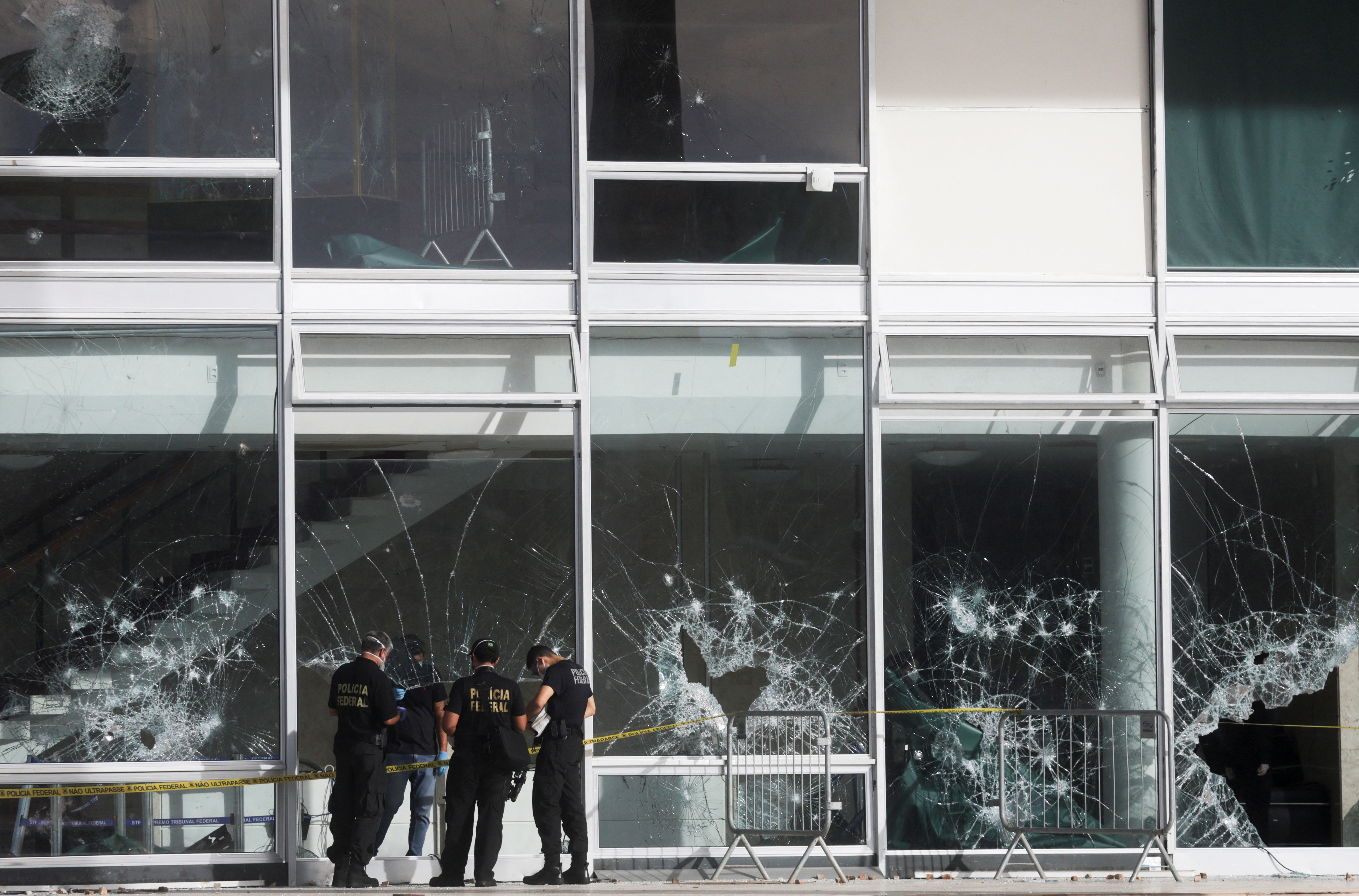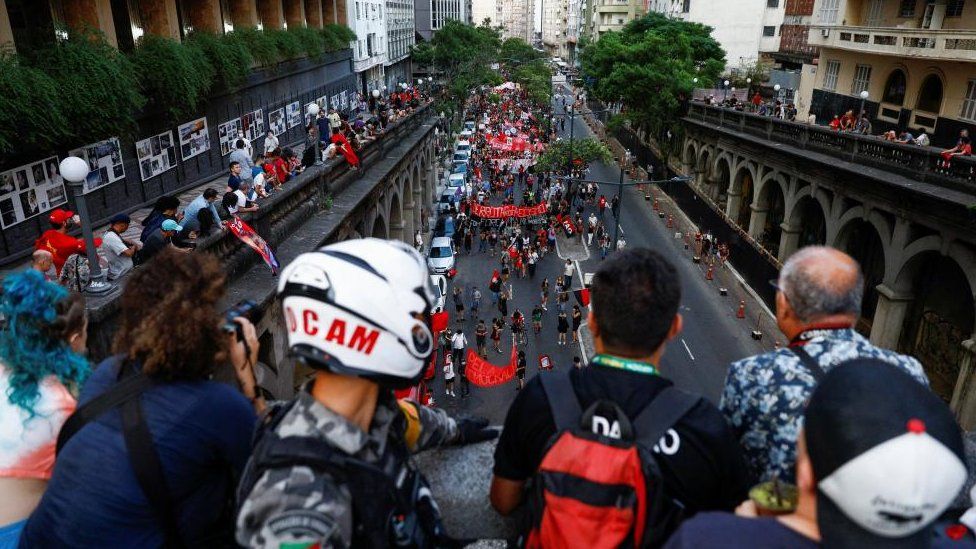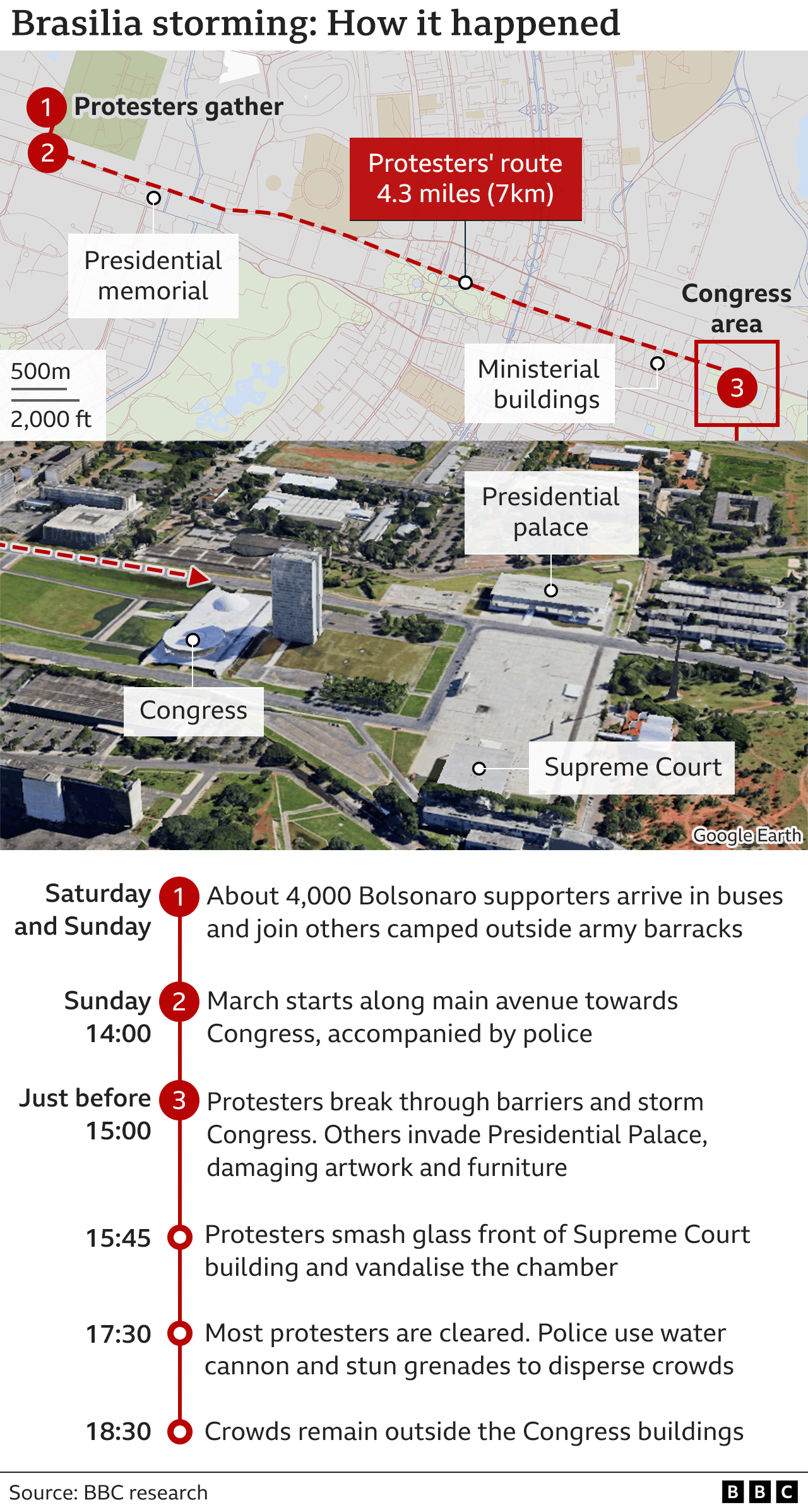The 'Trump' of Latin America
 |
| A view shows the damage caused following Brazil's anti-democratic riots, at the Supreme Court building in Brasilia, Brazil, January 9, 2023. REUTERS/Ricardo Moraes |
"They will not succeed in destroying Brazilian democracy. We need to say that fully, with all firmness and conviction.""We will not accept the path of criminality to carry out political fights in Brazil. A criminal is treated like a criminal."Justice Minister Flavio Dino, Rio de Janeiro, Brazil"Bolsonarism mimics the same strategies as Trumpism.""Our January 8 -- an unprecedented manifestation in Brazilian politics -- is clearly copied from January 6 in the Capitol.""Today's sad episodes represent yet another attempt to destabilize democracy and demonstrate that the authoritarian, populist radicalism of Brazil's extreme right remains active under the command of former president Bolsonaro, the 'Trump of Latin America'."Paulo Calmon, political-science professor, University of Brasilia
This
past Sunday Brazilians whose political framework refuses to accept the
victory vote in the recent general election that brought leftist Luiz
Inacio Lula de Silva back to power in Brazil rampaged through the
capital in a fury of rejection of the change of government, calling for
the return of defeated president Jair Bolsonaro. The populist
ex-president still has a passionate following in his country and they
deplore the return of Lula de Silva.
Protesters
on Sunday flowed in numbers into Congress, into the Supreme Court and
into the presidential palace grounds, calling for the return of the
former president and calling on the Brazilian military to restore
Bolsonaro by coup. A pro-Bolsonaro encampment located outside a military
building was broken up by police the following day, detaining about
1,200 people.
According
to Brazil's minister of institutional relations, the buildings that had
been stormed on Sunday would be inspected for evidence, including
fingerprints and video images to ensure that those who were involved
could be tracked down and held to account. There were further fears that
the rioters intended to inspire similar such events across the country.
Dressed
in the green and yellow of the Brazilian flag, rioters took to breaking
windows, turning over furniture, tossing computers and printers to the
ground outside buildings. A huge canvas of a nationalist painting at the
presidential palace was slashed and destroyed, along with other works
of art. At the Supreme Court, the U-shaped table that seats justices
when they convene, was overturned, a door was ripped off one office, and
an iconic statue standing outside the court was vandalized.
Governmental
buildings and their interiors were left in shambles. On Sunday, 300
people were arrested, caught in the act of destroying public property.
According to public prosecutors, local security forces had been
negligent; the regional government had been temporarily suspended by a
Supreme Court justice, and another justice placed blame on authorities
for failing to quickly crack down on emerging neo-fascism in Brazil.
Hardcore
supporters of ex-president Bolsonaro were convinced the electronic
voting system was prone to fraud following the October 30 electoral
defeat of the sitting government. Bolsonaro himself is no longer in
Brazil. He left for Florida where he was admitted to an Orlando hospital
with "abdominal pain", resulting from having been attacked and stabbed
in 2018 while he was campaigning for the presidency, causing gut
blockages and multiple hospitalizations over the years.
This
is Brazil; the hard-core right susceptible to violent clashes with
authorities in a polarized political arena where deeply left opponents
cause their own type of violence in personal attacks meant to be lethal
assassinations of those they deplore. Following his lost re-election,
Jair Bolsonaro simply left the scene, neither accepting defeat nor
congratulating his political opponent.
"I don't agree with what happened in Brasília - it was a nightmare. I don't agree with those who believe that with democracy you can use your power to destroy democracy.""I want to show to the world and our country that even though there are thousands of people who believe the elections weren't valid, here in Brazil, we have a gigantic number of people who believe we can trust our government, we can trust in our democracy."Gabriel, pro-Democracy rally, Sao Paulo, Brazil
 |
| A pro-democracy march in Porto Alegre in southern Brazil, around 1,200
miles (1931km) from the capital Brasilia, where the riots happened Reuters |
Labels: Brazil, Jair Bolsonaro, Luis Inacio Lula da Silva, Polarization, Presidential Election Riots


<< Home